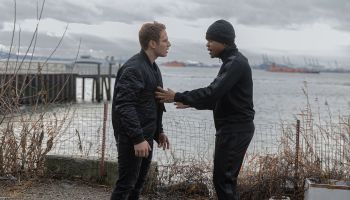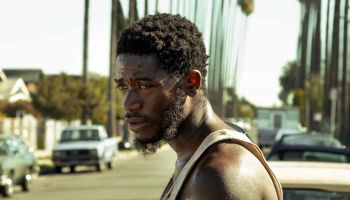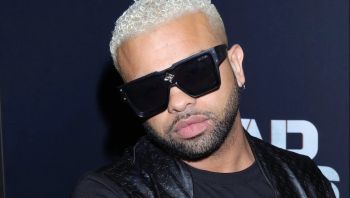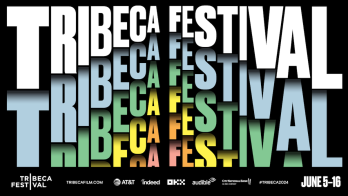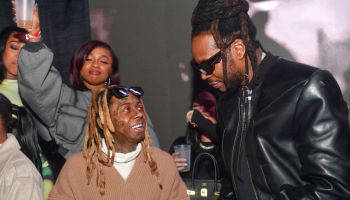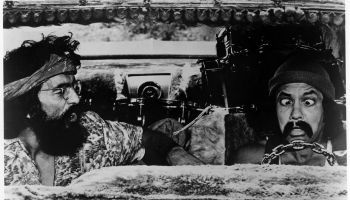Ladies and gentlemen, the bone breaking Chris Partlow has left the building.
Forget everything you knew about actor Gbenga Akinnagbe as a character on HBO’s acclaimed series The Wire and open your eyes to a whole new venture with the actor and activist’s name attached: Liberated People.
The Nigerian-American actor has launched a line of t-shirts that on the surface seem as if they are simply celebrating the independence dates of global locations, but after a chat with Gbenga, we learned the line holds so much more.
The t-shirt designs include homages to Nigeria, Ethiopia and Brazil with more countries to come, but the core of the messaging starts right here in the United States, in our own neighborhoods.
On the brink of his upcoming June 13th Liberated People pop up shop at Brooklyn boutique Shirley + Alice, GlobalGrind had the opportunity to catch up with Gbenga to talk about the recently launched line and the message he’s trying to spread one screenprinted t-shirt at a time.
Check out the insightful interview with Gbenga below.
GlobalGrind: Tell us a little about the background of your clothing line Liberated People. When did you get the idea and how did you decide to bring it to life?
Gbenga Akinnagbe: I was inspired by a few different things. A friend of mine a while back tried to make a clothing line and I dug the fact that they weren’t in that business but were like ‘why not?’ That encouraged me and I want to do something like it. Then, I had also been traveling, I like to travel a lot. For one reason or another, I ended up in different places, either protesting or doing a sit-in or whatever and just seeing different parts of the world. From Spain to Israel to here in Brooklyn, and I saw that a lot of people are fighting for the same things. The struggling and yelling, we are taking it to the streets for the same things. They just had different color faces and they have been doing it for decades and centuries, and their people before them have been doing it for a long time. It makes you think about the common struggle that we are in as the masses and as people. I wanted to make something to honor that, to highlight that, to show how much we have in common and to continue to inspire that social spark.
How do you select the countries highlighted for Liberated People? Are they places that you’ve been that touch you personally? Or places with the most notable revolutionary acts?
A great deal of what I want this company to be about is educating and learning things we didn’t know before, because there is a lot. We all know about certain countries and we hear the same stories about those countries. A lot of those stories aren’t even real.
They’re not.
Exactly, but that is just the lure that goes into the theme and then goes into the marketing and then you can sell that. So I wanted to highlight uncommon stories. And also get more of the people’s history. What I feel occurs there and what is occurring there. History from the “loser’s perspective,” which is in most cases far more accurate than what actually happened. That being said, I live here in New York, I travel a lot but I live here in New York, and I want this to be a global movement, but we have to start locally. So I wanted to reach out to communities that were represented in the large groups here in New York. Also communities that don’t have a big strong speaking voice in the States.
The goal is to get every country and the goal is actually much grander than that. The company Liberated People represents just not liberation of different nations around the world; it can be special liberation days. It can be what the company represents and helps highlight someone’s personal liberation date. It can be the day they got married. The day they got divorced. The day that they kicked heroin, the day that they found heroin. There’s no judgement on what your personal liberation day is. The day that you came out of the closet, anything. The day that you stopped lying to yourself. We want to highlight these personal liberation days as well and empowering people.
We spoke about the message behind the t-shirts, so I want to know a little bit more about the process that goes into the physical construction of the t-shirts and what makes it different from any other. Everyone has an organic t-shirt line, but what makes your t-shirts and your construction different?
Aside from the quality of the shirts and using a different cotton, we use an eco-friendly printing process that not only is best for the environment, but for the people wearing it. We do our best to use products that aren’t damaging to the environment, and also aren’t damaging the people. Me personally, I like to wear as few artificially made products as possible. That stuff affects us, one way or another. It just so happens that our printing process also makes a better t-shirt, it makes a better product that lasts longer. It comes more engraved in the shirt, not much on top of the shirt, and that was very important to me. Something that looks cooler as it got older.
So in 10 years there will be vintage Liberated People shirts?
Yeah, I like that. I like that. Exactly.
When it comes to your target demographic of people that you want representing your brand, what type of people do you want to see wearing your brand?
Honestly, it’s one thing to speak to a market that is pre-disposed to your message being a global citizen. I definitely want to speak to those people who want to get involved in the world around them, whether it’s just their community, whether it is another nation, just people who want to get involved, not even necessarily people who have a history of being involved, which would be great.
More importantly, I want people who have thought about it, sat on the sidelines for a while, and want to see something in this company and the message of this company and say, “I can do this too.” I don’t need to be Rockefeller, the billionaire, or the rapper. I don’t need to be someone famous or George Clooney. I don’t need to be any of these people to get involved in my community or reach out to one nationally. That’s who I want to speak to. I want to speak to people on the sidelines. I want to mobilize a demobilized populous.
Are there any specific types of non-profits that you want to be connected with more than others or any type of causes?
No, actually. Non-profits aren’t necessarily doing more good on the ground than damage, that’s one thing. They don’t just have great marketing strategies, everything looks great, but underground they are actually destroying the economy. You have to be very conscious with who you want to work with. I want to work with non-profits that stimulate growth to the community. Whether it is economic growth, intellectual, or freedom. When we talk about liberation, we mean it in all its forms. Economic liberation, personal liberation. We’d like to work with non-profits that do that in the communities that they serve.
**A portion of Liberated People T-shirt sales goes to Beat The Streets, a Baltimore wrestling, mentoring and tutoring program for young people.









